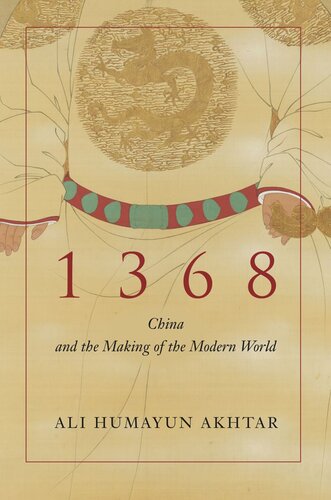

Most ebook files are in PDF format, so you can easily read them using various software such as Foxit Reader or directly on the Google Chrome browser.
Some ebook files are released by publishers in other formats such as .awz, .mobi, .epub, .fb2, etc. You may need to install specific software to read these formats on mobile/PC, such as Calibre.
Please read the tutorial at this link: https://ebookbell.com/faq
We offer FREE conversion to the popular formats you request; however, this may take some time. Therefore, right after payment, please email us, and we will try to provide the service as quickly as possible.
For some exceptional file formats or broken links (if any), please refrain from opening any disputes. Instead, email us first, and we will try to assist within a maximum of 6 hours.
EbookBell Team

4.0
6 reviewsA new picture of China's rise since the Age of Exploration and its historical impact on the modern world.
The establishment of the Great Ming dynasty in 1368 was a monumental event in world history. A century before Columbus, Beijing sent a series of diplomatic missions across the South China Sea and Indian Ocean that paved the way for China's first modern global era. 1368 maps China's ascendance from the embassies of Admiral Zheng He to the arrival of European mariners and the shock of the Opium Wars. In Ali Humayun Akhtar's new picture of world history, China's current rise evokes an earlier epoch, one that sheds light on where Beijing is heading today.
Spectacular accounts in Persian and Ottoman Turkish describe palaces of silk and jade in Beijing's Forbidden City. Malay legends recount stories of Chinese princesses arriving in Melaka with gifts of porcelain and gold. During Europe's Age of Exploration, Iberian mariners charted new passages to China, which the Dutch and British East India Companies transformed into lucrative tea routes.
But during the British Industrial Revolution, the rise of steam engines and factories allowed the export of the very commodities once imported from China. By the end of the Opium Wars and the arrival of Commodore Perry in Japan, Chinese and Japanese reformers called for their own industrial revolutions to propel them into the twentieth century.
What has the world learned from China since the Ming, and how did China reemerge in the 1970s as a manufacturing superpower? Akhtar's book provides much-needed context for understanding China's rise today and the future of its connections with both the West and a resurgent Asia.